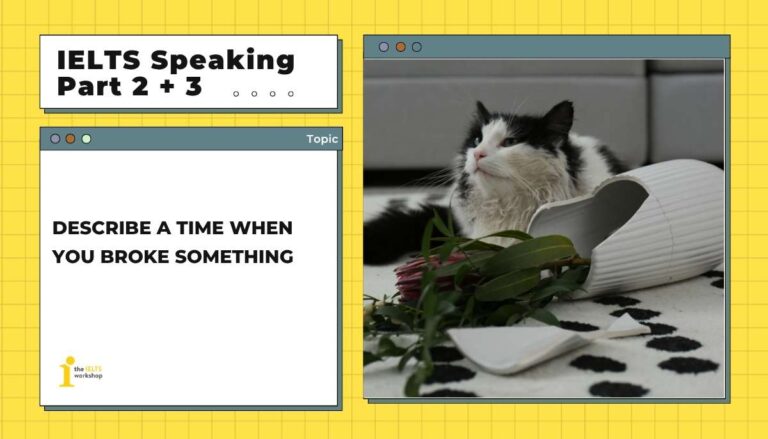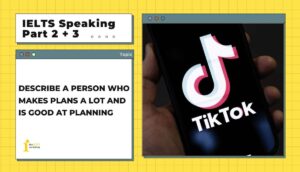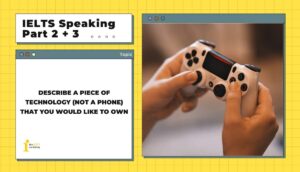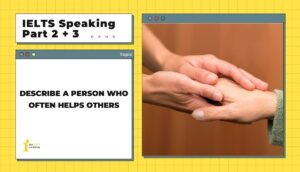Bài mẫu chủ đề “Describe a time when you broke something” của giáo viên Bùi Nam Giang cung cấp ý tưởng mạch lạc, từ vựng đa dạng và chiến lược trả lời hiệu quả cho IELTS Speaking Part 2.
Part 2: Describe a time when you broke something
You should say:
- What it was
- When/where that happened
- How you broke it
- And explain what you did after that
1. Bài mẫu (Sample)
I’d like to talk about a time when I accidentally broke a porcelain vase that my mom had bought from China. It was a very precious item to her, and I still feel guilty about it.
This incident happened about two years ago at home. It was during a family gathering when everyone was in the living room. The vase was placed on a high shelf in our living room, and it had been there for years. My mom had bought it when she went on a trip to China, and she always took great care of it. It was one of her prized possessions , and I could tell how much she cherished it.
The accident happened when I was tidying up the living room. I didn’t realize how close I was to the shelf, and I accidentally bumped into it while moving around. I didn’t even notice at first, but suddenly, I heard the sound of something falling and shattering. I turned around and saw the vase on the floor, completely shattered . I was in shock, and my heart sank immediately because I knew how much it meant to my mom.
After the incident, I knew I had to make amends. I immediately cleaned up the broken pieces and carefully disposed of them. When my mom found out, I apologized profusely , explaining that it was an accident and I didn’t mean to hurt her. She was understandably upset at first, but after some time, she forgave me. To make up for it, I promised to replace the vase with a similar one. Although I couldn’t get the exact same one, I managed to find one that had a similar design and brought it back as a gift. My mom appreciated the gesture, and it helped ease the situation.
That experience taught me to be much more careful with sentimental items, and I still feel a little guilty about it every time I think about how much my mom valued that vase.
Sample band 6.5+ by Bui Nam Giang, IELTS Teacher at The IELTS Workshop
2. Từ vựng (Vocabulary)
- Porcelain vase – bình gốm sứ
- Precious – quý giá
- Guilty – cảm thấy có lỗi
- High shelf – kệ cao
- Prized possessions – tài sản quý giá
- Cherished – yêu quý
- Tidying up – dọn dẹp
- Bumped into – va phải
- Shattered – vỡ vụn
- Shock – trạng thái ngạc nhiên và hoảng hốt
- Make amends – đền bù, sửa chữa sai lầm
- Cleaned up – dọn dẹp, làm sạch
- Profusely – rất nhiều, hết lòng
- Make up for it – đền bù cho điều gì đó
- Sentimental – mang tính cảm xúc, gắn bó
- Valued – trân trọng
Xem thêm: Cách học từ vựng IELTS hiệu quả từ thầy Đặng Trần Tùng 9.0
Part 3:
1. What kind of things are more likely to be broken by people at home?
At home, fragile items like porcelain figurines, glassware, or delicate electronics are more likely to be broken. These items are typically placed in high-traffic areas, where they can easily be knocked over or mishandled. People often underestimate the fragility of such objects, and accidents can happen when they are not being careful. In particular, younger children and pets are usually the ones who accidentally cause damage to these items.
- Fragile items – vật dễ vỡ
- Porcelain – sứ
- Delicate electronics – thiết bị điện tử tinh xảo
- Underestimate – đánh giá thấp
- In particular – đặc biệt là
2. What kind of people like to fix things by themselves?
People who are naturally hands-on or have a DIY mentality are more inclined to fix things by themselves. They tend to enjoy the process of solving problems and feel a sense of accomplishment when they complete a task independently. Such individuals might be interested in learning new skills, whether it’s fixing furniture or electronics, as it helps them feel empowered and self-sufficient. Many of these people enjoy the challenge of repairing things without needing professional help.
- Hands-on – thực tế, tham gia vào
- DIY mentality – thái độ tự làm
- Accomplishment – thành tựu
- Empowered – cảm thấy có quyền lực
- Self-sufficient – tự lập
- Challenge – thử thách
3. Do you think clothes produced in the factory are of better quality than those made by hand?
It really depends on the brand and the manufacturing process, but in general, factory-made clothes are more consistent in terms of size and style. However, handmade garments often stand out in terms of quality craftsmanship and attention to detail. Factory clothes are mass-produced, so they may lack the personal touch and uniqueness that handmade clothes often offer. That said, factory clothes are usually more affordable and more readily available.
- Factory-made – sản xuất hàng loạt
- Craftsmanship – sự khéo léo
- Attention to detail – chú ý đến chi tiết
- Personal touch – dấu ấn cá nhân
- Uniqueness – sự độc đáo
4. Do you think handmade clothes are more valuable?
Yes, I believe handmade clothes are often considered more valuable due to the effort and creativity that go into making them. Artisans who create handmade garments put in a lot of time and care, and their work is often seen as a form of art. These clothes may not only hold a higher intrinsic value but can also have a cultural significance. Because they are one-of-a-kind, they also tend to stand the test of time.
- Intrinsic value – giá trị tự nhiên
- Cultural significance – ý nghĩa văn hóa
- Art – nghệ thuật
- Stand the test of time – chịu được thử thách của thời gian
5. Is the older generation better at fixing things?
The older generation may be better at fixing things because they have grown up in an era where self-reliance and resourcefulness were essential. They often had to make do and were less likely to rely on modern technology for repairs. They tend to have more experience and knowledge passed down from previous generations, making them skilled in a variety of tasks, from repairing household items to maintaining older technology.
- Self-reliance – sự tự lập
- Resourcefulness – sự tháo vát
- Make do – xoay xở
- Skilled – có kỹ năng
- Maintaining – duy trì
6. Do you think elderly people should teach young people how to fix things?
Yes, I believe it would be incredibly beneficial if elderly people passed on their skills to younger generations. Not only would this help preserve traditional knowledge, but it would also teach young people to be more independent and resourceful. In today’s fast-paced world, many young people rely too much on convenience, so learning how to fix things can encourage a more sustainable lifestyle. It could also strengthen the bond between generations and provide a sense of legacy.
- Traditional knowledge – kiến thức truyền thống
- More sustainable lifestyle – lối sống bền vững hơn
- Legacy – di sản
Tạm kết
Hy vọng bài mẫu trên đã giúp bạn hình dung rõ cách triển khai ý tưởng và sử dụng ngôn ngữ phù hợp khi gặp chủ đề Describe a time when you broke something trong IELTS Speaking Part 2 & 3. Tham khảo các nguồn tài liệu hữu ích như KHO BÀI MẪU IELTS SPEAKING và Bộ đề dự đoán IELTS Speaking cập nhật mới nhất.
HỌC IELTS MIỄN PHÍ – lớp học độc quyền chỉ có trên website của The IELTS Workshop. Đăng ký để bắt đầu lộ trình học bài bản cùng thầy cô tại TIW ngay nhé!









